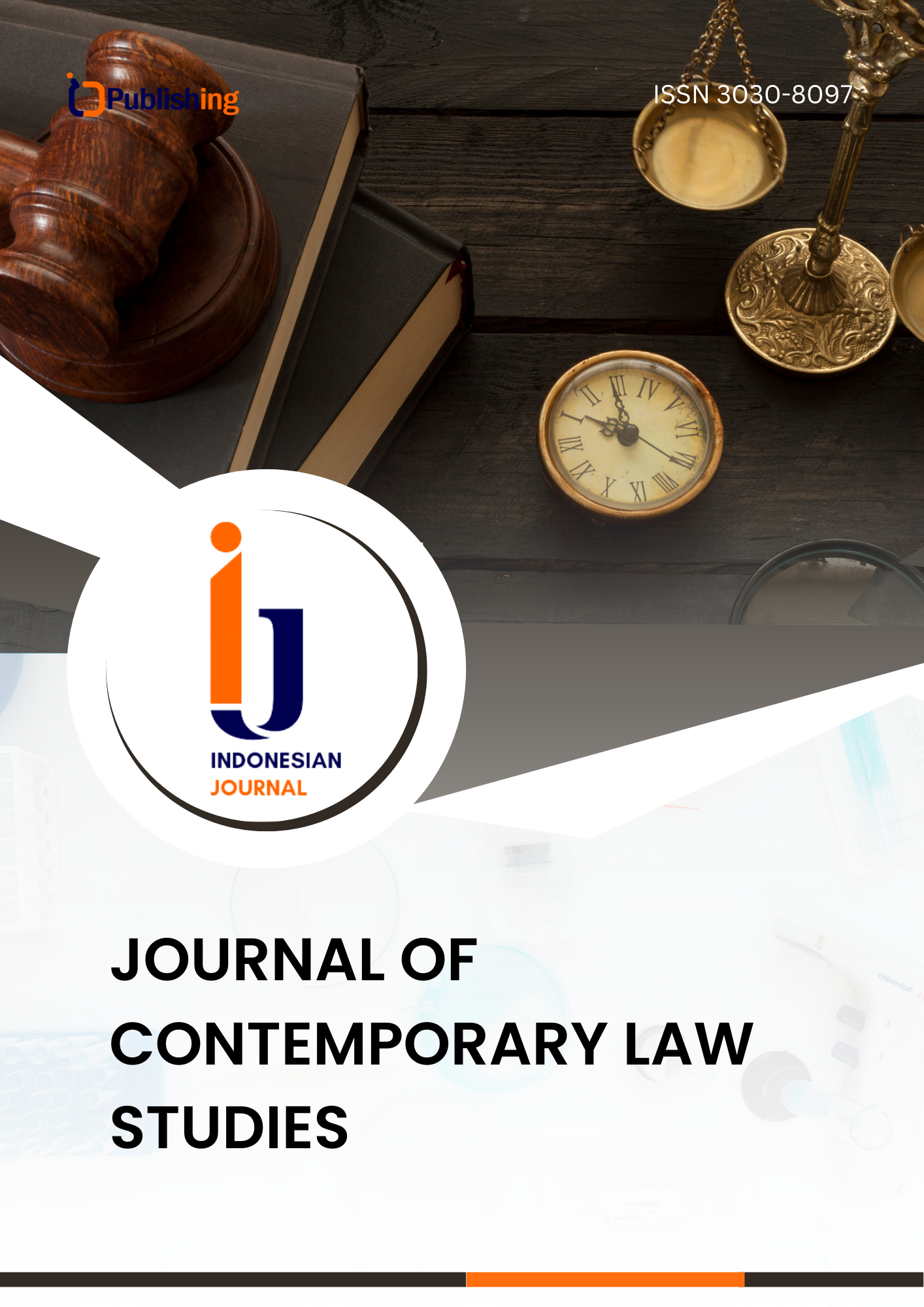Tinjauan Hukum tentang Tindak Pidana terhadap Agama dan Kepercayaan Menurut KUHP 2023 dengan Pendekatan Keadilan Korektif
DOI:
https://doi.org/10.47134/lawstudies.v2i3.4039Keywords:
Criminal Offense, Religion and Belief, KUHP 2023, Corrective JusticeAbstract
This study aims to analyze the legal regulation of criminal offenses against religion and belief under Indonesia’s 2023 Penal Code (KUHP) and to assess the effectiveness of the corrective justice approach in preventing legal misuse. The old Article 156a of the previous KUHP was often criticized for its vague interpretation and misuse against religious minority groups. The 2023 Penal Code introduces significant reforms, including more detailed provisions under Chapter VII and alternative sanctions such as community service. Using a normative legal method with statutory, conceptual, and case study approaches, the research finds that the 2023 Penal Code provides a more systematic and proportional framework for religion-related offenses. Furthermore, the adoption of corrective justice enables more restorative outcomes through mediation, restitution, and the avoidance of excessive criminalization. However, several challenges remain in its implementation, including overlaps with Law No. 1/PNPS/1965, limited understanding among law enforcement of corrective justice, and the absence of clear technical guidelines. The study concludes that the 2023 Penal Code marks a progressive step toward a more humane and modern criminal justice system. Its success, however, depends on a paradigm shift among law enforcement officials and regulatory harmonization. Future research should adopt an empirical approach to evaluate the practical application of corrective justice in religious diversity contexts.
References
Amali Mustofa Dzaky. (2024). DZAKY MUSHOFA AMALI_DELIK AGAMA DALAM UNDANG-UNDANG NOMOR 1 TAHUN 2023 TENTANG KUHP PERSPEKTIF FIKIH JINAYAH (Studi Undang-Undang Nomor 1 Tahun 2023 tentang KUHP). Universitas Prof. K.H. Saifuddin Zuhri.
Antara News. (2025). Ratu Entok yang nistakan Yesus divonis 34 bulan penjara. https://manado.antaranews.com/berita/277617/ratu-entok-yang-nistakan-yesus-divonis-34-bulan-penjara
Arief, H., & Ambarsari, N. (2018). PENERAPAN PRINSIP RESTORATIVE JUSTICE DALAM SISTEM PERADILAN PIDANA DI INDONESIA. Al-Adl : Jurnal Hukum, 10(2), 173. https://doi.org/10.31602/al-adl.v10i2.1362
Aristoteles. (2009). Nicomachean Ethics . Oxford University Press.
Azhari Iqbal Muhammad, & Yunaldi Wendra. (2024). Perbandingan Pengaturan Penistaan Agama berdasarkan Pasal 156a Undang- Undang No. 1 Tahun 1946 (KUHP Lama) dengan Pasal 300 Undang-undang No. 1 Tahun 2023 (KUHP Baru). INNOVATIVE: Journal Of Social Science Research, 4(5), 8029–8041.
Braithwaite. (2002). Restorative Justice and Responsive Regulation. Oxford University Press.
Crouch M. (2012). Law and Religion in Indonesia: The Constitutional Court and the Blasphemy Law. Asian Journal of Comparative Law, 1–46. https://doi.org/10.1017/S2194607800000601
De Sevres M. (2018). Legal Pluralism and Religious Minorities in Indonesia. Journal of Law and Religion, 33(3), 173–187. https://doi.org/10.1017/jlr.2018.28
Detiknews. (2022). Jejak Kasus Meme Stupa: Roy Suryo Lapor, Dipolisikan, Dituntut 1,5 Tahun Bui. https://news.detik.com/berita/d-6463178/jejak-kasus-meme-stupa-roy-suryo-lapor-dipolisikan-dituntut-1-5-tahun-bui
Hertanto Eko. (2024). Implications of the reformulation of the offense of blasphemy in the new criminal code. The Prosecutor Law Review, 2(3). https://prolev.kejaksaan.go.id/kejaksaan/article/download/52/34/
Iqbal Muhammad, & Yunaldi. (2024). Transformasi Hukum Pidana yang Lebih Adil dan Modern dalam KUHP Nasional. Hukumonline.com.
Lengkong, & Situmeang. (2023). Makna Delik Penodaan Agama dalam Pasal 156a KUHP dan Undang-Undang Nomor 1 Tahun 2023 tentang KUHP. JPPI (Jurnal Penelitian Pendidikan Indonesia).
Lindsey. (2012). Monopolising Islam? The Indonesian Ulama Council and State Regulation of the “Islamic Economy”. Bulletin of Indonesian Economic Studies, 253–274. https://doi.org/10.1080/00074918.2012.694157
M Dahri. (2017). Tindak Pidana Penodaan Agama di Indonesia: Tinjauan Pengaturan Perundang-Undangan dan Konsep Hukum Islam. AT-TAFAHUM: Journal of Islamic Law.
Menchik. (2014). Productive Intolerance: Godly Nationalism in Indonesia. Comparative Studies in Society and History, 56(3), 591–621. https://doi.org/10.1017/S0010417514000250
Nurlaelawati, & Salim. (2017). Islamic Legal Norms and the Reinterpretation of Blasphemy Law in Indonesia: A Critical Review. A Critical Review. Al-Jami’ah: Journal of Islamic Studies, 55(2), 305–328. https://doi.org/10.14421/ajis.2017.552.305-328
Sudjana. (2021). Hukum Progresif dan Keadilan Korektif dalam Reformasi Sistem Pemidanaan di Indonesia. Prenadamedia Group.
Syamsuddin Muhammad. (2021). Blasphemy, Law, and Tolerance in Indonesia: A Legal and Social Overview. Al-Ihkam: Jurnal Hukum Dan Pranata Sosial, 16(2), 275–299. https://doi.org/10.19105/al-lhkam.v16i2.5153
Tornudd. (2000). Alternatives to Imprisonment in Developing Countries: Some Lessons Learned. United Nations Asia and Far East Institute Resource Material Series, 5(6), 21–28. https://doi.org/10.18356/05663aa1-en
Wahyuni S, & Gunarto. (2020). Legal Protection for Religious Minorities from Religious Defamation Perspective in Indonesia. Jurnal Pembaharuan Hukum, 7(2), 173–187. https://doi.org/10.26532/jph.v7i2.11220
Yusran. (2021). The Role of Restorative Justice in Indonesia’s Criminal Justice System: From Alternative to Mainstream. Jurnal Hukum IUS, 9(3), 553–569. https://doi.org/10.29303/ius.v9i3.1122
Downloads
Published
How to Cite
Issue
Section
License
Copyright (c) 2025 Fathin Abdullah, Rifka Safira, Naqia Annisa Faradiz

This work is licensed under a Creative Commons Attribution 4.0 International License.




